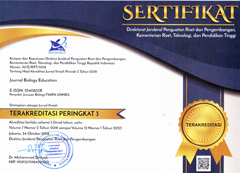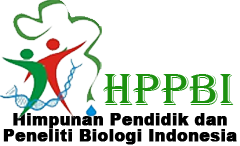The Research-Based Respiration System Teaching Material Supplements to Improve Attitudes Refuse Shisha
Abstract
The development of teaching material supplements is tailored to the needs of students and complements existing teaching materials. Based on KD 3.8 for class XI in the 2013 curriculum, the material for respiration systems, learning begins with an analysis of facts. The facts from the latest research presented in the book are still limited. So that research-based teaching material supplements are needed. Teaching material supplements are developed by integrating the facts of research results, namely related to exposure to shisha smoke to the respiratory system. The purpose of this study was to determine the validity, practicality and effectiveness of the developed teaching material supplements. This research is a Research and Development study which refers to the modified steps of Sugiyono (2015). The stages in this research are identification of potential problems, data collection, product design, design validation, design revision, product testing and product revision. Product validation is carried out by material expert lecturers and media expert lecturers. Product trials were conducted by collecting teacher and student response data to teaching material supplements. The results showed that teaching material supplements were very valid according to material experts with a percentage of 84.68% and very valid according to media experts with a percentage of 98.08%. The practicality level of teaching material supplements by the teacher is considered very practical with a percentage of 85% and very practical according to students with a percentage of 83.81%. The effectiveness level of teaching material supplements based on a questionnaire on the attitude of rejecting shisha before and after being given teaching material supplements has a very high increase in rejecting shisha.
The copyright of the article once it is accepted for publication shall be assigned to the journal as the publisher. The intended copyright includes the right to publish the article in various forms (including reprints). The journal maintains the publishing rights to the published articles.
This work is licensed under a Creative Commons Attribution 4.0 International License.







